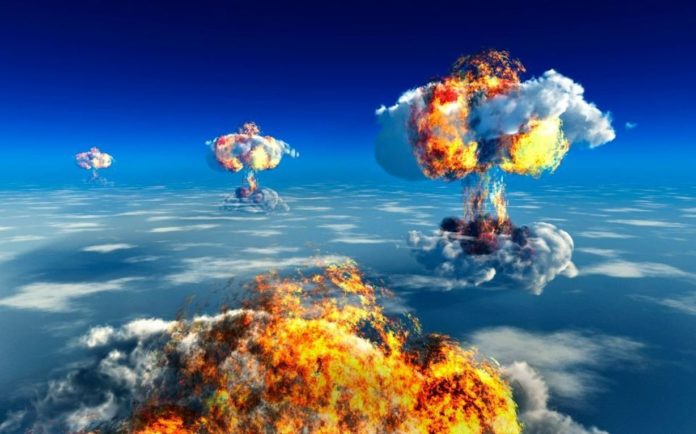A new study published today shows the global interconnectedness of Earth’s ecosystems, especially in the face of a nuclear war.
Nuclear war fears have been heightened by Russia’s invasion of Ukraine. But what kind of effects might today’s nuclear bombs have on the world? A new study published today reveals startling data on the worldwide consequences of nuclear war.
Cheryl Harrison, an assistant professor in the LSU Department of Oceanography & Coastal Sciences, and the other authors of the study used numerous computer simulations to examine the effects of smaller-scale and regional nuclear warfare on the Earth’s systems in light of current nuclear warfare capabilities.
According to the Stockholm International Peace Research Institute, nine countries presently command more than 13,000 nuclear weapons around the world.
In every scenario tested by the researchers, nuclear firestorms would spew soot and smoke into the upper atmosphere, obscuring the Sun and causing global crop loss.
Average worldwide temperatures would drop by around 13 degrees Fahrenheit in the first month after a nuclear explosion, a greater drop in temperature than during the previous Ice Age.
“It doesn’t matter who is bombing whom. It can be India and Pakistan or NATO and Russia,” says Harrison, who has a joint appointment at the LSU Center for Computation & Technology, “Once the smoke is released into the upper atmosphere, it spreads globally and affects everyone.”
Even when the smoke clears, the ocean temperatures would not recover to their pre-war levels. As the earth cools, sea ice expands to more than 6 million square miles and 6 feet deep in certain basins, obstructing key ports such as the Port of Tianjin in Beijing, Copenhagen, and St. Petersburg.
The sea ice would spread to places along the coast that don’t usually get ice. This would stop ships from going anywhere in the Northern Hemisphere, making it hard to get food and supplies to places like Shanghai, where ships aren’t ready to deal with sea ice.
The abrupt decrease in light and water temperatures, particularly from the Arctic to the North Atlantic and North Pacific oceans, would destroy the marine algae, the cornerstone of the marine food web, causing a famine in the ocean. Aquaculture and fishing would come to a halt.
The researchers ran a computer model of what would happen to Earth’s systems if the United States and Russia used 4,400 100-kiloton nuclear weapons to bomb cities and industrial areas, causing fires that released 150 teragrams, or more than 330 billion pounds, of smoke and sunlight-absorbing black carbon into the upper atmosphere.
Additionally, they created a computer model of what would occur if Pakistan and India each exploded 500 100-kiloton nuclear weapons, which would release 5 to 47 teragrams, or 11 to 103 billion pounds, of smoke and soot into the upper sky.
“Nuclear warfare results in dire consequences for everyone. World leaders have used our studies previously as an impetus to end the nuclear arms race in the 1980s,” adds co-author Alan Robock, “and five years ago to pass a treaty in the United Nations to ban nuclear weapons. We hope that this new study will encourage more nations to ratify the ban treaty.”
This study demonstrates the interdependence of Earth’s ecosystems on a worldwide scale, particularly in the presence of disturbances like volcanic eruptions, major wildfires, or armed conflict.
“The current war in Ukraine with Russia and how it has affected gas prices,” according to Harrison, “really shows us how fragile our global economy and our supply chains are to what may seem like regional conflicts and perturbations.”
Particle clouds are another aftermath of volcanic eruptions in the high atmosphere. These eruptions have historically had detrimental effects on the environment and civilization.
“We can avoid nuclear war, but volcanic eruptions are definitely going to happen again. There’s nothing we can do about it, so it’s important when we’re talking about resilience and how to design our society, that we consider what we need to do to prepare for unavoidable climate shocks,” notes Harrison. “We can and must however, do everything we can to avoid nuclear war. The effects are too likely to be globally catastrophic.”
Oceans recover more slowly than land does.
In the worst-case scenario for the U.S. and Russia, the oceans will likely take decades to recover on the surface and hundreds of years to recover at depth. At the same time, changes to the Arctic sea ice will likely last thousands of years and be like a “Nuclear Little Ice Age.”
According to the scientists, both the original perturbation and the new ocean state will severely alter marine ecosystems, with long-term, worldwide effects on ecosystem services like fisheries.
Image Credit: Getty
You were reading: This Is The Global Impact Of A Nuclear War On Earth’s Ecosystem, According To New Study
